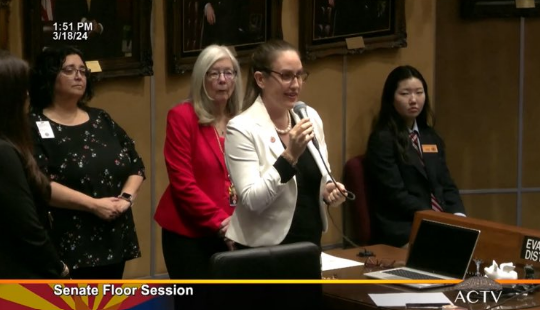
by Daniel Stefanski | Mar 21, 2024 | News
By Daniel Stefanski |
A bill that would safeguard Arizona lands from being owned by foreign adversaries is progressing through the state legislature along partisan lines.
Last week, the Arizona Senate passed SB 1403, which would “prohibit a foreign principal from a designated country from, directly or indirectly, purchasing, owning, acquiring by grant or devising or having any other interest in real property in Arizona” – according to the purpose from the chamber.
Sixteen Republicans voted for the legislation, compared to 12 Democrats (two members did not vote).
According to the bill, “designated country” is defined “as a country that is identified by the U.S. Director of National Intelligence as a country that poses a risk to the national security of the United States in each of the three most recent Annual Threat Assessments of the U.S. intelligence community.”
After the vote, the Arizona Senate Republican Caucus’ “X” account posted, “JUST IN – China, Russia, Iran & North Korea are enemy nations who only want to unleash harm on the United States and pose an incredible risk to our national security on a daily basis. Today, Senate Democrats voted ‘NO’ on legislation prohibiting these countries from owning land in Arizona. The Left’s reckless disregard for the safety of our state and our citizens continues to be on full display through every irresponsible vote undermining our efforts to protect our communities.”
Senator Janae Shamp, the bill’s sponsor, added, “It was very disappointing to see only Republicans vote in support of a bill that our state’s military asked to protect our citizens, especially because the bill initially received bipartisan support in committee. SB 1403 prohibits organizations in a country determined to be a serious threat to the United States, from owning or leasing property in Arizona. I created this legislation because of real threats Luke Air Force Base has experienced. This base is home to the elite F-35 squadrons that train the world’s greatest fighter pilots around the clock to protect our nation. Arizona is also home to the Barry M. Goldwater range in Yuma, which is the third-largest land base in the US. Foreign adversaries have no business buying property near these bases, but this is happening, and it’s a threat to national security.”
The second-year lawmaker opined on why members of the minority party in the chamber might have opposed her legislation, writing, “Why were Democrats so outraged over Saudis owning Arizona farmland, and yet they have no concern for these other real-time security threats? The answer: political theatre.”
Daniel Stefanski is a reporter for AZ Free News. You can send him news tips using this link.

by Corinne Murdock | Mar 21, 2024 | News
By Corinne Murdock |
State Sen. Eva Burch (D-LD09) called her GOP colleagues “cruel” for restricting her ability to abort her child.
Burch made the remarks in a speech on the Senate floor on Monday. The senator said that she learned that her pregnancy was not progressing — nonviable — and that she had opted for abortion rather than wait on a miscarriage.
“I’m choosing abortion because I’m pregnant and for reasons that I should not have to explain to you, or to the church, or to the state of Arizona. I need to not be pregnant anymore. That’s the best outcome for me,” said Burch.
Burch said she was unable to receive an abortion from an abortion clinic last Friday as quickly as she desired due to state law requiring an ultrasound, informed consent, and a 24-hour waiting period.
“I don’t think people should have to justify their abortions,” said Burch. “There’s no one-size-fits-all for people seeking abortion care, and the legislature doesn’t have any right to assign one.”
Arizona law requires an abortionist to obtain the “voluntary and informed consent” of a mother based on the diagnosed condition of her unborn children.
A mother given a lethal fetal diagnosis must be advised of perinatal hospice services as an alternative to abortion. A lethal fetal condition is defined as a pre-birth diagnosis expected to result in the death of the unborn child within three months after birth.
A mother given a nonlethal fetal diagnosis must be advised of the range of outcomes for individuals living with the diagnosed condition; government and nongovernmental resources for mitigating the condition; and options for adoption.
Burch claimed that the informed consent requirement was a means to “shame, coerce, and frighten” her.
The senator also relayed her experience with a previous pregnancy that ended in a miscarriage. Burch claimed that she was unable to obtain treatment to remove her deceased embryo because her condition wasn’t deemed “critical enough.” Per state law, abortion doesn’t include the termination of an ectopic pregnancy or removal of a dead fetus. This is a definition supported and reiterated by Attorney General Kris Mayes.
“[I]f you have a miscarriage and the doctor performs a surgical procedure to remove the deceased fetus, that is not an abortion,” states a webpage on abortion by Mayes.
Failure to remove a dead fetus from the uterus in a timely manner can cause deadly complications, such as disseminated intravascular coagulation. Denial of such lifesaving care would be considered medical malpractice.
Even so, Burch claimed lawmakers were to blame for her physical and emotional duress.
“The clauses for emergencies aren’t good enough. These laws can serve to intimidate doctors and it muddies the waters when they’re trying to make complex decisions in situations that are really volatile,” said Burch.
Arizona prohibits abortion after 15 weeks of pregnancy, and outright bans abortions sought for reasons of fetal genetic abnormality, race, or sex.
Burch said it was “inappropriate” for women seeking an abortion to have to undergo the transvaginal ultrasound.
Burch didn’t go into the details of her unborn child’s nonviability. Though uncommon, misdiagnosis of nonviability early on in pregnancy does occur for various reasons, such as an inaccurate conception date causing an inability to detect a fetal heartbeat. These misdiagnoses are usually caught with a followup ultrasound.
Burch also claimed that abortion carries a lower risk than pregnancy. The senator also cited datasets determining that women who can’t receive an abortion were more likely to be domestic violence victims, facing eviction and bankruptcy, bearing children with developmental delays, and poor.
Corinne Murdock is a reporter for AZ Free News. Follow her latest on Twitter, or email tips to corinne@azfreenews.com.

by Elizabeth Troutman | Mar 21, 2024 | Economy, News
By Elizabeth Troutman |
Arizona ranked as the nation’s 10th most federally dependent state in 2024, according to personal finance website WalletHub.
WalletHub compared the 50 states across three metrics: return on taxes paid to the federal government, federal funding as a share of state revenue, and share of federal jobs.
While Arizona’s overall rank was tenth, the Grand Canyon state ranked 15th for return on taxes paid to the federal government, fifth for federal funding as a share of state revenue, and 23rd for share of federal jobs.
President of the Arizona Free Enterprise Club Scot Mussi took issue with WalletHub’s methodology.
“WalletHub doesn’t do a great job outlining their methodology, but from what I can gather they are basing ‘dependency’ on federal payouts, regardless of the purpose of the funds,” Mussi said. “For example, states with more military bases are likely punished as being more ‘dependent’ on federal funds. So to rectify the dependency problem should we equally spread out military bases among all 50 states so that every state receives equal funding? That makes no sense.”
Mussi said he wonders if Arizona has a higher dependency score due to the number of retirees from states like Illinois and California.
“Because people choose to come to Arizona, does that mean we are a “dependency” state?” Mussi asked. “Again, not a great metric to measure dependency.”
Blue states were found to be less financially dependent than red states.
“Regardless of whether the distribution of federal funds is fair or not, living in one of the most federally dependent states can be beneficial for residents,” WalletHub Analyst Cassandra Happe said in a news release. “For every dollar residents of the top states pay in taxes, they get several dollars back in federal funding, which often leads to higher-quality infrastructure, education, public health and more.”
Alaska was found to be the most federally financially dependent state, followed by New Mexico, Kentucky, West Virginia, and Mississippi. New Jersey ranked as the least dependent.
“Alaska is the most federally dependent state, with over 57% of the state’s revenue coming from federal funding,” Happe said. “For every $1 that residents pay in taxes, the state receives $2.47 in federal funding. Plus, nearly 5% of Alaska’s workforce is employed by the federal government, one of the highest rates in the country.”
Vanderbilt professor Carolyn J. Heinrich said federal resources often support programs that increase societal benefits and reduce societal costs.
“For example, Title I funds in education are distributed according to the level of family economic disadvantage, recognizing that it is important to ensure that all children are healthy and well-educated,” she said. “State resources may be prioritized for uses that yield benefits primarily within the state, such as economic development incentives.”
Mussi said he does think there are examples of states benefiting from their congressmen bringing home federal money for special interest and pork projects.
“Senators from West Virginia have been notorious for this activity, and it should be opposed,” he said. “But metrics like state dependency don’t ever seem to accurately reflect this type of activity, so we usually never rely on them.”
Elizabeth Troutman is a reporter for AZ Free News. You can send her news tips using this link.

by Corinne Murdock | Mar 20, 2024 | Education, News
By Corinne Murdock |
A coalition of Arizona State University (ASU) students, Students Against Apartheid at ASU (SAGA), plan to protest the suspension of a pro-Palestine student group, MECHA de ASU.
The planned protest to reinstate MECHA de ASU is scheduled to occur on Thursday at 11:30 am on the student services building lawn. ASU suspended the group for a since-deleted Instagram post calling for the death of certain groups in February. The university’s Student Rights and Responsibilities Office and police force are investigating the incident.
“Mecha believes in revolution. Not reform. We do not condemn the Al Aqsa flood. We do not condemn Hamas. We do not condemn resistance. Death to boer. Death to the Pilgrim. Death to the zionist. Death to the settler. Glory to the Martyrs! Freedom to the prisoners! Victory to the resistance!”
“Al-Aqsa Flood” was the formal operation name for the Hamas terrorist attack on Israel last October. “Death to boer” is a reference to a traditional chant calling for the genocide of white South African farmers, famously sang last fall by Africa’s Economic Freedom Fighters (EFF) at a political rally. Based on the inclusion of the “boer” reference, then, “death to the Pilgrim” could be referring to those who make their pilgrimage to Israel to worship, or it could be referring to America’s first English settlers.
In a press release issued on Sunday, SAGA said that MECHA de ASU’s post was mainly about comparing police brutality in Arizona to the violence of the Israel-Hamas conflict.
SAGA also took issue with the amount of time ASU has taken to conduct its investigation into the incident, specifically its delay in responding to MECHA de ASU’s appeal of their suspension. ASU reportedly promised to respond within five business days of the appeal, but had yet to do so as of SAGA’s press release.
“The university is using this fraudulent investigation process to silence and surveil MECHA for protesting an ongoing genocide ASU is complicit in,” said SAGA.
SAGA has the explicit goal of stopping “ASU’s investment in the settler colonial state known as ‘Israel’.” In a more recent statement, the coalition accused ASU of being complicit in “the zionist occupation and genocide of Palestinians.” SAGA demanded that the university cease all partnerships and investments with companies and institutions supportive of Israel, as well as cease its investigation and suspension of MECHA de ASU.
Masks will be required for Thursday’s protest, as a means to prevent the transmission of COVID-19 and other communicable airborne diseases.
In addition to advocating for MECHA de ASU’s return, SAGA has been coordinating in a boycott of Starbucks for its support of Israel. Like with Thursday’s protest, SAGA meetings and events have required masking.
Corinne Murdock is a reporter for AZ Free News. Follow her latest on Twitter, or email tips to corinne@azfreenews.com.

by Elizabeth Troutman | Mar 20, 2024 | Education, News
By Elizabeth Troutman |
Arizona State University’s journalism school teaches students “cultural sensitivities, civil discourse, bias awareness and diversity initiatives.”
The Walter Cronkite School of Journalism and Mass Communication requires students in at least three of the undergraduate degree programs to take a course called “Diversity and Civility at Cronkite,” the Goldwater Institute uncovered.
ASU’s online course catalog says the class “emphasizes the importance of diversity, inclusion, equity and civility to ensure all Cronkite students feel represented, valued and supported.”
The course “Offers training and awareness on cultural sensitivities, civil discourse, bias awareness and diversity initiatives at the Cronkite School and ASU” and “Empowers students to approach reporting and communication projects with a multicultural perspective and inspire mutual respect among students from various backgrounds and beliefs within different Cronkite professional paths,” the catalog says.
The “Learning Outcomes” on the course syllabus lay out identity categories: “By the end of this course, students will be able to … understand the value of their own and other people’s identities in terms of the work and study at Cronkite.”
The course’s seven units affirm the theme of identity. Units include “Race & Ethnicity,” “Geography and Income,” “Language & Citizenship,” “Sexuality and Gender Identity,” “(Dis)ability,” and “Differences and Conflict.”
The “Race & Ethnicity” unit includes the learning objective “Learn what microaggressions are and why they matter.” The instructor asks students to review a list of “typical microaggressions” published on a University of Minnesota webpage.
Examples of microaggressions include “America is a melting pot,” a statement that demands that people “assimilate/acculturate to the dominant culture;” “There is only one race, the human race,” a statement “denying the individual as a racial/cultural being;” “I believe the most qualified person should get the job,” a statement communicating that “people of color are given extra unfair benefits because of their race;” and “Everyone can succeed in this society, if they work hard enough,” a statement communicating that “people of color are lazy and/or incompetent and need to work harder.”
A week of the course is dedicated to discussing “sexuality and gender identity” to make students:
- Understand the difference between sexuality and gender identity and why it matters.
- Recognize privileges related to sexuality and gender identity.
- Know how to ask for and why to use a person’s pronouns and the benefits of gender-neutral language.
The unit includes an assignment to read an article which defines nonbinary as “a term that can be used by people who do not describe themselves or their genders as fitting into the categories of man or woman,” and Agender as “an adjective that can describe a person who does not identify as any gender.”
Students are asked to demonstrate what they learned about gender ideology by responding to the following prompt:
“Imagine you’re working at a PR firm and you have a client whose first album is about to drop. Your client’s gender identity is nonbinary and they use they/them pronouns. They have a massive press tour planned.
How do you prepare journalists to talk with your client?”
Diversity initiatives at ASU are not limited to the journalism school. Goldwater identified more than 100 classes offered in ASU’s Spring 2024 course catalog that include terms like “diversity,” “equity,” and “inclusion,” or that fulfill the university’s general education requirement in “diversity.”
“To return Arizona’s public universities to their educational missions, it is imperative that the institutions themselves—or the bodies who oversee them—adopt a change in policy to eliminate politicized ‘diversity’ based course requirements such as DCC,” said Timothy K. Minella, senior fellow at the Goldwater Institute’s Van Sittert Center for Constitutional Advocacy.
Elizabeth Troutman is a reporter for AZ Free News. You can send her news tips using this link.

by Elizabeth Troutman | Mar 20, 2024 | Economy, News
By Elizabeth Troutman |
Reports show that the Biden administration plans to finalize its final tailpipe emissions rule for cars and trucks on Wednesday, a measure 61% of Arizonans oppose.
The final EPA rule covers both carbon dioxide and conventional pollutants for vehicle model years 2027 through 2032. This is part of the administration’s effort to ban new gas, diesel, and flex fuel vehicles from the U.S. market.
The possible rule could mean that nearly 70% of cars sold in 2032 would need to be electric vehicles, though this is not achievable with our current infrastructure and would make us more reliant on China, according to government relations firm AxAdvocacy.
Chet Thompson, American Fuel & Petrochemical Manufacturers (AFPM) president and CEO, said the EPA policy will feel like a ban for consumers.
“It will vastly restrict both their access to and ability to afford new gas cars, trucks, SUVs and traditional hybrids,” Thompson said. “And there are no offramps in the policy in the event our infrastructure isn’t ready or consumers simply don’t buy EVs at the rate EPA would like. This is exactly why 75% of registered voters solidly oppose any government efforts designed to ban gas, diesel and traditional hybrid cars.”
President Joe Biden has been clear since 2020 he intends to use his federal agencies and the state of California to eliminate sales of new gas cars.
“While multiple administration policies push us toward this end, the Environmental Protection Agency’s (EPA’s) passenger vehicle standards will do most of the damage on their own—requiring approximately 70% of new car sales to be electric in less than eight years,” he said. “This policy is bad for consumers, the economy and national security.”
“It will sacrifice our hard-won U.S. energy strength for even greater dependence on China and the EV battery and mineral supply chain China controls,” Thompson continued.
Only 16% of Arizonans support the rule, which would deprive Americans of the right to select the car best for them, their families, and their budgets.
Opposition for the rule is high in the key presidential and senate battleground states. Almost 90% of Michiganders oppose efforts to ban new gas cars and impose electric vehicle mandates.
In Wisconsin, 64% of residents oppose the measure, while 57% of Pennyslanvanians oppose, 61% of Nevadans oppose, and 66% of Ohioans oppose. Only 9% of Montana residents support the potential rule.
Elizabeth Troutman is a reporter for AZ Free News. You can send her news tips using this link.






